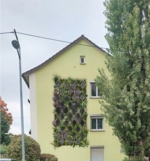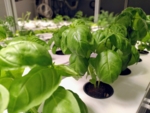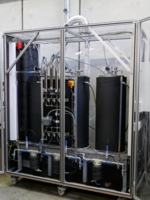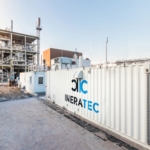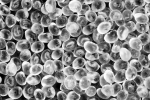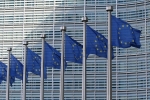-
-
-
Think Tank FYI: Agriculture 5.0 - 16/02/2023
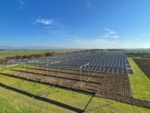
Climate protection, agriculture and biodiversity are closely intertwined. Agriculture 5.0 provides positive guidance, as the Offenburg University of Applied Sciences has demonstrated: agrophotovoltaics (or agrivoltaics), which is currently in vogue in Germany, can be used to generate solar power on high-yield fields. Biomass strips and biochar remove CO2 from the atmosphere. All this improves soil quality and promotes biodiversity.
https://www.biooekonomie-bw.de/en/articles/news/agriculture-50-fighting-climate-crisis-agrophotovoltaics-and-biochar
-
Synergistic effects with microalgae and purple bacteria - 03/02/2023
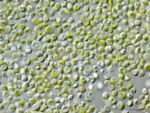
A biorefinery that uses industrial wastewater and residual material streams is being built in Rheinfelden (Baden). It will have two interlinking bioreactors and will synthesize biohydrogen as well as organic basic materials such as carotenoids and proteins. SmartBioH2-BW is a pilot project run by the Urban and Industrial Biorefineries initiative and funded by the Baden-Württemberg Ministry of the Environment, Climate Protection and Energy Sector.
https://www.biooekonomie-bw.de/en/articles/news/working-towards-hydrogen-economy-wastewater-biorefinery-smartbioh2-bw-project
-
Press release - 06/10/2022
Basic chemicals, which are needed as raw materials for a wide range of products such as medicines and detergents, can currently only be produced with an enormously high input of energy and raw materials. In many cases, fossil fuels and raw materials are still used. The extraction of chemical substances alone requires high temperatures, expensive catalysts made of precious metals and, in some cases, environmentally harmful starting materials.
https://www.biooekonomie-bw.de/en/articles/pm/neue-elektrolyseverfahren-fuer-eine-nachhaltige-chemische-produktion
-
Press release - 20/05/2022
The construction industry consumes large amounts of energy resources and produces tons of waste. At the Solar Decathlon Europe 21/22 university competition, students and researchers from KIT are eager to demonstrate that the building sector is already compatible with a functioning circular economy. The task of the interdisciplinary “RoofKIT” team is to convert previously unused roofs of buildings into usable spaces.
https://www.biooekonomie-bw.de/en/articles/pm/roofkit-how-build-recycling-oriented-and-sustainable-way
-
Filament winding technology for sustainable construction - 06/04/2022

One of the greatest challenges in the construction industry is the transition to more environmentally friendly and resource-saving buildings. Researchers at the University of Stuttgart are combining state-of-the-art robotic filament winding technologies with ancient local crops to produce stable and sustainable lightweight structures from flax fibres.
https://www.biooekonomie-bw.de/en/articles/news/robotic-building-natural-fibres
-
-
Press release - 13/01/2022
Making important raw materials for fine chemicals out of carbon dioxide really works. As part of the Max Planck collaborative project eBioCO2n, a team of researchers from Fraunhofer IGB have successfully performed a first ever fixation of CO2 via a multi-enzyme enzyme reaction driven by electricity yielding a prospective intermediate for the chemical industry. The process for electro-biocatalytic CO2 fixation was recently published and is…
https://www.biooekonomie-bw.de/en/articles/pm/turning-harmful-co2-useful-chemicals
-
Climate-friendly circular economy - 11/11/2021
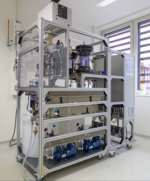
A Fraunhofer team has successfully produced a dye using CO2 adsorbed from the air. The aim is to move towards a climate- and resource-friendly circular economy. Chemicals, as well as fuels, can be produced cost-effectively using this process. How does the technical process work, and what opportunities does it open up?
https://www.biooekonomie-bw.de/en/articles/news/co2-air-raw-material-chemicals
-
-
-
-
Press release - 22/02/2021
Agrivoltaics enables the dual use of arable land: Photovoltaic modules, which are mounted on a structure, generate renewable electricity and underneath agricultural crops grow. The approach increases land efficiency and could mitigate conflicts over the use of arable land in the future. A new guideline provides up-to-date information on the technology, its potential and the current state of development.
https://www.biooekonomie-bw.de/en/articles/pm/Dual-Yield-on-Arable-Land-Guideline-for-Agrivoltaics-Published
-
-
-
Dossier - 28/04/2020
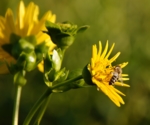
Biomass from forestry and agriculture along with residues from industry and households can contribute to our energy and raw material shift. Sustainable, regenerative biomass-based energy can become part of the energy mix of the future within the framework of a bioeconomy.
https://www.biooekonomie-bw.de/en/articles/news/Sustainable-bioenergy
-
Biogas and wood as components of the energy transition - 10/02/2020
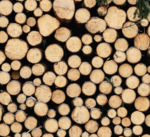
Decentralised, controllable and stable - renewable energy is an important component in the transition to a bioeconomy without fossil fuels. BIOPRO spoke to PD Dr. Andreas Lemmer from the State Institute of Agricultural Engineering and Bioenergy at the University of Hohenheim and Prof. Dr. Stefan Pelz, scientific director of the Institute for Applied Research and professorat the University of Applied Forest Sciences Rottenburg.
https://www.biooekonomie-bw.de/en/articles/news/New-perspectives-for-bioenergy
-
-
-
Article - 27/03/2019
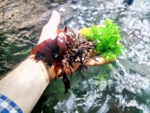
Algae are frugal organisms. They require only light, water, minerals and carbon dioxide to be able to produce biomass. These properties will now be exploited economically in a two-year research project. Dr. Stefan Sebök from the University of Hamburg plans to study the holistic utilisation of degradation products of a biogas plant in Wallerstädten by linking them to land-based algae cultivation.
https://www.biooekonomie-bw.de/en/articles/news/residues-from-biogas-plants-as-feed-for-algae
-
-
Dossier - 23/09/2013
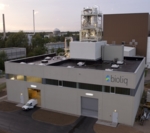
On the one hand, a bioeconomy relies on renewable resources to meet society’s need for food, energy and industrial products. On the other, it emphasises the role of biogenic material flows. The bioeconomy model is expected to reduce our dependency on fossil fuels in the long term. In order to implement the shift to a biobased economy on the regional level, the Baden-Württemberg government launched the Bioeconomy Research Strategy in summer 2013.
https://www.biooekonomie-bw.de/en/articles/dossiers/bioeconomy-a-new-model-for-industry-and-the-economy
-
-
Dossier - 14/05/2012
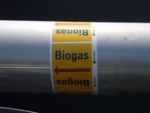
In addition to sunlight water and wind biogas is a regenerative source of energy that contributes to saving fossil resources. Germany is home to around 7100 biogas plants including 796 as of 2011 in Baden-Württemberg. In 2010 these facilities produced 11 per cent of the electricity generated from renewables in Germany. Energy-rich methane is the major constituent of biogas and is produced when organic compounds are broken down by bacteria in the…
https://www.biooekonomie-bw.de/en/articles/dossiers/biogas-a-promising-source-of-renewable-energy
Website address: https://www.biooekonomie-bw.de/en/search
